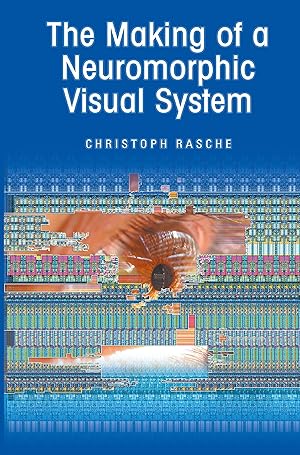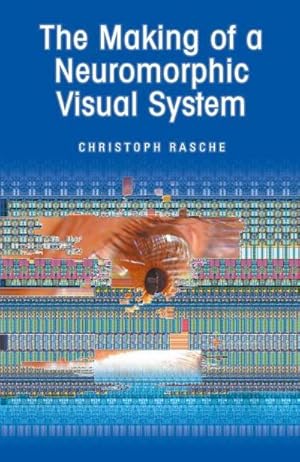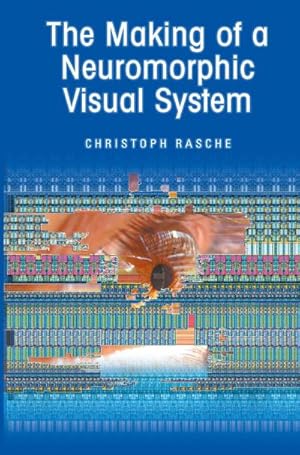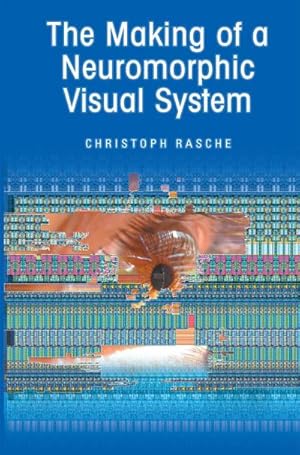making neuromorphic visual system de christoph rasche (30 résultats)
CommentairesFiltres de recherche
Type d'article
- Tous les types de produits
- Livres (30)
- Magazines & Périodiques (Aucun autre résultat ne correspond à ces critères)
- Bandes dessinées (Aucun autre résultat ne correspond à ces critères)
- Partitions de musique (Aucun autre résultat ne correspond à ces critères)
- Art, Affiches et Gravures (Aucun autre résultat ne correspond à ces critères)
- Photographies (Aucun autre résultat ne correspond à ces critères)
- Cartes (Aucun autre résultat ne correspond à ces critères)
- Manuscrits & Papiers anciens (Aucun autre résultat ne correspond à ces critères)
Etat En savoir plus
- Neuf (26)
- Comme neuf, Très bon ou Bon (2)
- Assez bon ou satisfaisant (Aucun autre résultat ne correspond à ces critères)
- Moyen ou mauvais (Aucun autre résultat ne correspond à ces critères)
- Conformément à la description (2)
Particularités
- Ed. originale (Aucun autre résultat ne correspond à ces critères)
- Signé (Aucun autre résultat ne correspond à ces critères)
- Jaquette (Aucun autre résultat ne correspond à ces critères)
- Avec images (10)
- Sans impressions à la demande (25)
Langue (1)
Prix
- Tous les prix
- Moins de EUR 20 (Aucun autre résultat ne correspond à ces critères)
- EUR 20 à EUR 45
- Plus de EUR 45
Livraison gratuite
Pays
Evaluation du vendeur
-
The Making Of A Neuromorphic Visual System
Vendeur : Romtrade Corp., STERLING HEIGHTS, MI, Etats-Unis
EUR 45,04
Autre deviseGratuit expédition depuis Etats-Unis vers FranceQuantité disponible : 2 disponible(s)
Ajouter au panierEtat : New. This is a Brand-new US Edition. This Item may be shipped from US or any other country as we have multiple locations worldwide.
-
EUR 47,04
Autre deviseGratuit expédition depuis Etats-Unis vers FranceQuantité disponible : 2 disponible(s)
Ajouter au panierEtat : New. Brand New Original US Edition. Customer service! Satisfaction Guaranteed.
-
EUR 45
Autre deviseEUR 7 expédition depuis Allemagne vers FranceQuantité disponible : 1 disponible(s)
Ajouter au panierHardcover. 140 S. Ehem. Bibliotheksexemplar mit Signatur und Stempel. GUTER Zustand, ein paar Gebrauchsspuren. Ex-library with stamp and library-signature. GOOD condition, some traces of use. 9780387234687 Sprache: Englisch Gewicht in Gramm: 550.
-
The Making of a Neuromorphic Visual System.
Langue: anglais
Vendeur : Antiquariat Bookfarm, Löbnitz, Allemagne
EUR 33,50
Autre deviseEUR 7 expédition depuis Allemagne vers FranceQuantité disponible : 1 disponible(s)
Ajouter au panierHardcover. Ehem. Bibliotheksexemplar mit Signatur und Stempel. GUTER Zustand, ein paar Gebrauchsspuren. Ex-library with stamp and library-signature. GOOD condition, some traces of use. Sprache: Englisch Gewicht in Gramm: 550.
-
EUR 57,49
Autre deviseGratuit expédition depuis Australie vers FranceQuantité disponible : 1 disponible(s)
Ajouter au panierBrand new book. Fast ship. Please provide full street address as we are not able to ship to P O box address.
-
The Making of A Neuromorphic Visual System
Edité par Springer
Langue: anglais
Vendeur : Books in my Basket, New Delhi, Inde
EUR 32,46
Autre deviseEUR 16,30 expédition depuis Inde vers FranceQuantité disponible : 2 disponible(s)
Ajouter au panierN.A. Etat : New. ISBN:9780387234687 N.A.
-
EUR 97,15
Autre deviseGratuit expédition depuis Australie vers FranceQuantité disponible : 1 disponible(s)
Ajouter au panierBrand new book. Fast ship. Please provide full street address as we are not able to ship to P O box address.
-
The Making Of A Neuromorphic Visual System
Vendeur : Romtrade Corp., STERLING HEIGHTS, MI, Etats-Unis
EUR 108,20
Autre deviseGratuit expédition depuis Etats-Unis vers FranceQuantité disponible : 1 disponible(s)
Ajouter au panierEtat : New. This is a Brand-new US Edition. This Item may be shipped from US or any other country as we have multiple locations worldwide.
-
EUR 135,92
Autre deviseGratuit expédition depuis Australie vers FranceQuantité disponible : 1 disponible(s)
Ajouter au panierBrand new book. Fast ship. Please provide full street address as we are not able to ship to P O box address.
-
EUR 136,16
Autre deviseEUR 9,70 expédition depuis Allemagne vers FranceQuantité disponible : Plus de 20 disponibles
Ajouter au panierEtat : New.
-
EUR 136,16
Autre deviseEUR 9,70 expédition depuis Allemagne vers FranceQuantité disponible : Plus de 20 disponibles
Ajouter au panierGebunden. Etat : New.
-
The Making of a Neuromorphic Visual System
Vendeur : Ria Christie Collections, Uxbridge, Royaume-Uni
EUR 157,97
Autre deviseEUR 4,56 expédition depuis Royaume-Uni vers FranceQuantité disponible : Plus de 20 disponibles
Ajouter au panierEtat : New. In.
-
The Making of a Neuromorphic Visual System
Vendeur : Ria Christie Collections, Uxbridge, Royaume-Uni
EUR 162,44
Autre deviseEUR 4,56 expédition depuis Royaume-Uni vers FranceQuantité disponible : Plus de 20 disponibles
Ajouter au panierEtat : New. In.
-
EUR 162,91
Autre deviseEUR 10,99 expédition depuis Allemagne vers FranceQuantité disponible : 1 disponible(s)
Ajouter au panierTaschenbuch. Etat : Neu. Druck auf Anfrage Neuware - Printed after ordering - The reader is presented an approach to the construction of a visual system, which is behaviorally, computationally and neurally motivated. The central goal is to characterize the process of visual categorization and to find a suitable representation format that can successfully deal with the structural variability existent within visual categories. It does not define such representations a priori but attempts to show directions on how to gradually work towards them. The book reviews past and existent theories of visual object and shape recognition in the fields of computer vision, neuroscience and psychology. The entire range of computations is discussed, as for example contour extraction in retinal circuits, orientation determination in cortical networks, position and scale independence of shape, as well as the issue of object and shape representation in a neural substrate. Region-based approaches are discussed and are modeled with wave-propagating networks. It is demonstrated how those networks operate on gray-scale images. A completely novel shape recognition architecture is proposed that can recognize simple shapes under various degraded conditions. It is discussed how such networks can be used for constructing basic-level object representations. It is envisioned how those networks can be implemented using the method of neuromorphic engineering, an analog electronic hardware substrate than can run neural computations in real-time and with little power.
-
The Making of a Neuromorphic Visual System
Edité par Springer US, Springer New York Nov 2004, 2004
ISBN 10 : 0387234683 ISBN 13 : 9780387234687
Langue: anglais
Vendeur : buchversandmimpf2000, Emtmannsberg, BAYE, Allemagne
EUR 160,49
Autre deviseEUR 15 expédition depuis Allemagne vers FranceQuantité disponible : 2 disponible(s)
Ajouter au panierBuch. Etat : Neu. Neuware -Arma virumque cano, Trojae qui primus ab oris Italiamfato profugus, Laviniaque venit litora. This is the beginning of Ovid's story about Odysseus leaving Trojae to find his way home. I here tell about my own Odysee-like ex- riences that I have undergone when I attempted to simulate visual recognition. The Odyssee started with a structural description - tempt, then continued with region encoding with wave propagation and may possibly continue with a mixture of several shape descr- tion methods. Although my odyssey is still under its way I have made enough progress to convey the gist of my approach and to compare it to other vision systems. My driving intuition is that visual category representations need to be loose in order to be able to cope with the visual structural va- ability existent within categories and that these loose representations are somehow expressed as neural activity in the nervous system. I - gard such loose representations as the cause for experiencing visual illusions and the cause for many of those effects discovered in att- tional experiments. During my effort to find such loose represen- tions, I have made sometimes unexpected experiences that forced me to continuously rethink my approach and to abandon or turn over some of my initially strongly believed viewpoints.Springer Verlag GmbH, Tiergartenstr. 17, 69121 Heidelberg 152 pp. Englisch.
-
The Making of a Neuromorphic Visual System
Edité par Springer US, Springer US, 2004
ISBN 10 : 0387234683 ISBN 13 : 9780387234687
Langue: anglais
Vendeur : AHA-BUCH GmbH, Einbeck, Allemagne
EUR 167,14
Autre deviseEUR 10,99 expédition depuis Allemagne vers FranceQuantité disponible : 1 disponible(s)
Ajouter au panierBuch. Etat : Neu. Druck auf Anfrage Neuware - Printed after ordering - The reader is presented an approach to the construction of a visual system, which is behaviorally, computationally and neurally motivated. The central goal is to characterize the process of visual categorization and to find a suitable representation format that can successfully deal with the structural variability existent within visual categories. It does not define such representations a priori but attempts to show directions on how to gradually work towards them. The book reviews past and existent theories of visual object and shape recognition in the fields of computer vision, neuroscience and psychology. The entire range of computations is discussed, as for example contour extraction in retinal circuits, orientation determination in cortical networks, position and scale independence of shape, as well as the issue of object and shape representation in a neural substrate. Region-based approaches are discussed and are modeled with wave-propagating networks. It is demonstrated how those networks operate on gray-scale images. A completely novel shape recognition architecture is proposed that can recognize simple shapes under various degraded conditions. It is discussed how such networks can be used for constructing basic-level object representations. It is envisioned how those networks can be implemented using the method of neuromorphic engineering, an analog electronic hardware substrate than can run neural computations in real-time and with little power.
-
EUR 209,36
Autre deviseEUR 7,72 expédition depuis Etats-Unis vers FranceQuantité disponible : 4 disponible(s)
Ajouter au panierEtat : New. pp. 140.
-
EUR 157,32
Autre deviseEUR 64,31 expédition depuis Etats-Unis vers FranceQuantité disponible : Plus de 20 disponibles
Ajouter au panierEtat : New.
-
EUR 157,67
Autre deviseEUR 64,31 expédition depuis Etats-Unis vers FranceQuantité disponible : Plus de 20 disponibles
Ajouter au panierEtat : New.
-
EUR 209,65
Autre deviseEUR 28,59 expédition depuis Royaume-Uni vers FranceQuantité disponible : 1 disponible(s)
Ajouter au panierHardcover. Etat : Like New. Like New. book.
-
The Making of a Neuromorphic Visual System (Paperback)
Edité par Birkhauser Boston Inc, Secaucus, 2014
ISBN 10 : 146149849X ISBN 13 : 9781461498490
Langue: anglais
Vendeur : Grand Eagle Retail, Mason, OH, Etats-Unis
EUR 180,17
Autre deviseEUR 64,31 expédition depuis Etats-Unis vers FranceQuantité disponible : 1 disponible(s)
Ajouter au panierPaperback. Etat : new. Paperback. Arma virumque cano, Trojae qui primus ab oris Italiamfato profugus, Laviniaque venit litora. This is the beginning of Ovid's story about Odysseus leaving Trojae to find his way home. I here tell about my own Odysee-like ex- riences that I have undergone when I attempted to simulate visual recognition. The Odyssee started with a structural description - tempt, then continued with region encoding with wave propagation and may possibly continue with a mixture of several shape descr- tion methods. Although my odyssey is still under its way I have made enough progress to convey the gist of my approach and to compare it to other vision systems. My driving intuition is that visual category representations need to be loose in order to be able to cope with the visual structural va- ability existent within categories and that these loose representations are somehow expressed as neural activity in the nervous system. I - gard such loose representations as the cause for experiencing visual illusions and the cause for many of those effects discovered in att- tional experiments.During my effort to find such loose represen- tions, I have made sometimes unexpected experiences that forced me to continuously rethink my approach and to abandon or turn over some of my initially strongly believed viewpoints. Shipping may be from multiple locations in the US or from the UK, depending on stock availability.
-
The Making of a Neuromorphic Visual System (Hardcover)
Edité par Springer-Verlag New York Inc., New York, NY, 2004
ISBN 10 : 0387234683 ISBN 13 : 9780387234687
Langue: anglais
Vendeur : Grand Eagle Retail, Mason, OH, Etats-Unis
EUR 180,60
Autre deviseEUR 64,31 expédition depuis Etats-Unis vers FranceQuantité disponible : 1 disponible(s)
Ajouter au panierHardcover. Etat : new. Hardcover. Arma virumque cano, Trojae qui primus ab oris Italiamfato profugus, Laviniaque venit litora. This is the beginning of Ovid's story about Odysseus leaving Trojae to find his way home. I here tell about my own Odysee-like ex- riences that I have undergone when I attempted to simulate visual recognition. The Odyssee started with a structural description - tempt, then continued with region encoding with wave propagation and may possibly continue with a mixture of several shape descr- tion methods. Although my odyssey is still under its way I have made enough progress to convey the gist of my approach and to compare it to other vision systems. My driving intuition is that visual category representations need to be loose in order to be able to cope with the visual structural va- ability existent within categories and that these loose representations are somehow expressed as neural activity in the nervous system. I - gard such loose representations as the cause for experiencing visual illusions and the cause for many of those effects discovered in att- tional experiments.During my effort to find such loose represen- tions, I have made sometimes unexpected experiences that forced me to continuously rethink my approach and to abandon or turn over some of my initially strongly believed viewpoints. Presents an approach to the construction of a visual system. This work aims to characterize the process of visual categorization and find a suitable representation format that can deal with the structural variability. It reviews various theories of visual object and shape recognition in the fields of computer vision, neuroscience and psychology. Shipping may be from multiple locations in the US or from the UK, depending on stock availability.
-
EUR 223,78
Autre deviseEUR 28,59 expédition depuis Royaume-Uni vers FranceQuantité disponible : 1 disponible(s)
Ajouter au panierPaperback. Etat : Like New. Like New. book.
-
The Making of a Neuromorphic Visual System (Paperback)
Edité par Birkhauser Boston Inc, Secaucus, 2014
ISBN 10 : 146149849X ISBN 13 : 9781461498490
Langue: anglais
Vendeur : AussieBookSeller, Truganina, VIC, Australie
EUR 278,52
Autre deviseEUR 31,73 expédition depuis Australie vers FranceQuantité disponible : 1 disponible(s)
Ajouter au panierPaperback. Etat : new. Paperback. Arma virumque cano, Trojae qui primus ab oris Italiamfato profugus, Laviniaque venit litora. This is the beginning of Ovid's story about Odysseus leaving Trojae to find his way home. I here tell about my own Odysee-like ex- riences that I have undergone when I attempted to simulate visual recognition. The Odyssee started with a structural description - tempt, then continued with region encoding with wave propagation and may possibly continue with a mixture of several shape descr- tion methods. Although my odyssey is still under its way I have made enough progress to convey the gist of my approach and to compare it to other vision systems. My driving intuition is that visual category representations need to be loose in order to be able to cope with the visual structural va- ability existent within categories and that these loose representations are somehow expressed as neural activity in the nervous system. I - gard such loose representations as the cause for experiencing visual illusions and the cause for many of those effects discovered in att- tional experiments.During my effort to find such loose represen- tions, I have made sometimes unexpected experiences that forced me to continuously rethink my approach and to abandon or turn over some of my initially strongly believed viewpoints. Shipping may be from our Sydney, NSW warehouse or from our UK or US warehouse, depending on stock availability.
-
The Making of a Neuromorphic Visual System (Hardcover)
Edité par Springer-Verlag New York Inc., New York, NY, 2004
ISBN 10 : 0387234683 ISBN 13 : 9780387234687
Langue: anglais
Vendeur : AussieBookSeller, Truganina, VIC, Australie
EUR 289,11
Autre deviseEUR 31,73 expédition depuis Australie vers FranceQuantité disponible : 1 disponible(s)
Ajouter au panierHardcover. Etat : new. Hardcover. Arma virumque cano, Trojae qui primus ab oris Italiamfato profugus, Laviniaque venit litora. This is the beginning of Ovid's story about Odysseus leaving Trojae to find his way home. I here tell about my own Odysee-like ex- riences that I have undergone when I attempted to simulate visual recognition. The Odyssee started with a structural description - tempt, then continued with region encoding with wave propagation and may possibly continue with a mixture of several shape descr- tion methods. Although my odyssey is still under its way I have made enough progress to convey the gist of my approach and to compare it to other vision systems. My driving intuition is that visual category representations need to be loose in order to be able to cope with the visual structural va- ability existent within categories and that these loose representations are somehow expressed as neural activity in the nervous system. I - gard such loose representations as the cause for experiencing visual illusions and the cause for many of those effects discovered in att- tional experiments.During my effort to find such loose represen- tions, I have made sometimes unexpected experiences that forced me to continuously rethink my approach and to abandon or turn over some of my initially strongly believed viewpoints. Presents an approach to the construction of a visual system. This work aims to characterize the process of visual categorization and find a suitable representation format that can deal with the structural variability. It reviews various theories of visual object and shape recognition in the fields of computer vision, neuroscience and psychology. Shipping may be from our Sydney, NSW warehouse or from our UK or US warehouse, depending on stock availability.
-
The Making of a Neuromorphic Visual System
Vendeur : BuchWeltWeit Ludwig Meier e.K., Bergisch Gladbach, Allemagne
EUR 160,49
Autre deviseEUR 11 expédition depuis Allemagne vers FranceQuantité disponible : 2 disponible(s)
Ajouter au panierTaschenbuch. Etat : Neu. This item is printed on demand - it takes 3-4 days longer - Neuware -The reader is presented an approach to the construction of a visual system, which is behaviorally, computationally and neurally motivated. The central goal is to characterize the process of visual categorization and to find a suitable representation format that can successfully deal with the structural variability existent within visual categories. It does not define such representations a priori but attempts to show directions on how to gradually work towards them. The book reviews past and existent theories of visual object and shape recognition in the fields of computer vision, neuroscience and psychology. The entire range of computations is discussed, as for example contour extraction in retinal circuits, orientation determination in cortical networks, position and scale independence of shape, as well as the issue of object and shape representation in a neural substrate. Region-based approaches are discussed and are modeled with wave-propagating networks. It is demonstrated how those networks operate on gray-scale images. A completely novel shape recognition architecture is proposed that can recognize simple shapes under various degraded conditions. It is discussed how such networks can be used for constructing basic-level object representations. It is envisioned how those networks can be implemented using the method of neuromorphic engineering, an analog electronic hardware substrate than can run neural computations in real-time and with little power. 152 pp. Englisch.
-
The Making of a Neuromorphic Visual System
Vendeur : BuchWeltWeit Ludwig Meier e.K., Bergisch Gladbach, Allemagne
EUR 160,49
Autre deviseEUR 11 expédition depuis Allemagne vers FranceQuantité disponible : 2 disponible(s)
Ajouter au panierBuch. Etat : Neu. This item is printed on demand - it takes 3-4 days longer - Neuware -The reader is presented an approach to the construction of a visual system, which is behaviorally, computationally and neurally motivated. The central goal is to characterize the process of visual categorization and to find a suitable representation format that can successfully deal with the structural variability existent within visual categories. It does not define such representations a priori but attempts to show directions on how to gradually work towards them. The book reviews past and existent theories of visual object and shape recognition in the fields of computer vision, neuroscience and psychology. The entire range of computations is discussed, as for example contour extraction in retinal circuits, orientation determination in cortical networks, position and scale independence of shape, as well as the issue of object and shape representation in a neural substrate. Region-based approaches are discussed and are modeled with wave-propagating networks. It is demonstrated how those networks operate on gray-scale images. A completely novel shape recognition architecture is proposed that can recognize simple shapes under various degraded conditions. It is discussed how such networks can be used for constructing basic-level object representations. It is envisioned how those networks can be implemented using the method of neuromorphic engineering, an analog electronic hardware substrate than can run neural computations in real-time and with little power. 152 pp. Englisch.
-
The Making of a Neuromorphic Visual System
Edité par Springer US, Springer New York Dez 2014, 2014
ISBN 10 : 146149849X ISBN 13 : 9781461498490
Langue: anglais
Vendeur : buchversandmimpf2000, Emtmannsberg, BAYE, Allemagne
EUR 160,49
Autre deviseEUR 15 expédition depuis Allemagne vers FranceQuantité disponible : 1 disponible(s)
Ajouter au panierTaschenbuch. Etat : Neu. This item is printed on demand - Print on Demand Titel. Neuware -Arma virumque cano, Trojae qui primus ab oris Italiamfato profugus, Laviniaque venit litora. This is the beginning of Ovid's story about Odysseus leaving Trojae to find his way home. I here tell about my own Odysee-like ex- riences that I have undergone when I attempted to simulate visual recognition. The Odyssee started with a structural description - tempt, then continued with region encoding with wave propagation and may possibly continue with a mixture of several shape descr- tion methods. Although my odyssey is still under its way I have made enough progress to convey the gist of my approach and to compare it to other vision systems. My driving intuition is that visual category representations need to be loose in order to be able to cope with the visual structural va- ability existent within categories and that these loose representations are somehow expressed as neural activity in the nervous system. I - gard such loose representations as the cause for experiencing visual illusions and the cause for many of those effects discovered in att- tional experiments. During my effort to find such loose represen- tions, I have made sometimes unexpected experiences that forced me to continuously rethink my approach and to abandon or turn over some of my initially strongly believed viewpoints.Springer Verlag GmbH, Tiergartenstr. 17, 69121 Heidelberg 152 pp. Englisch.
-
The Making of a Neuromorphic Visual System
Vendeur : Majestic Books, Hounslow, Royaume-Uni
EUR 221,21
Autre deviseEUR 10,12 expédition depuis Royaume-Uni vers FranceQuantité disponible : 4 disponible(s)
Ajouter au panierEtat : New. Print on Demand pp. 140.
-
The Making of a Neuromorphic Visual System
Vendeur : Biblios, Frankfurt am main, HESSE, Allemagne
EUR 224,97
Autre deviseEUR 7,95 expédition depuis Allemagne vers FranceQuantité disponible : 4 disponible(s)
Ajouter au panierEtat : New. PRINT ON DEMAND pp. 140.














